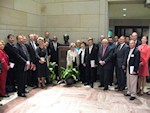 4/16/2012 - Raoul Wallenberg Remembered on Capitol Hill. U.S. Congressman Harris recalls Col. Ferenc Koszorus, Sr., Hero of the Holocaust. AHF honors the millions of lives lost and the untold suffering caused by Nazism and Communism. But even during the horrors of WWII, stories of resistance to Nazi atrocities emerged. When Hitler's patience ran out with the conservative leaders in Budapest and their peace-feelers
and contacts with Western allies, Nazi Germany invaded Hungary in March 1944, drastically
changing the situation of Hungary and the Jewish community. 4/16/2012 - Raoul Wallenberg Remembered on Capitol Hill. U.S. Congressman Harris recalls Col. Ferenc Koszorus, Sr., Hero of the Holocaust. AHF honors the millions of lives lost and the untold suffering caused by Nazism and Communism. But even during the horrors of WWII, stories of resistance to Nazi atrocities emerged. When Hitler's patience ran out with the conservative leaders in Budapest and their peace-feelers
and contacts with Western allies, Nazi Germany invaded Hungary in March 1944, drastically
changing the situation of Hungary and the Jewish community.
On April 16, the Hungarian Holocaust Remembrance Day, Deputy State Secretary Gergely Prőhle, Members of Congress, the Lantos family, representatives of various Embassies - including from Wallenberg's native Sweden and Israel - AHF representatives and friends of Hungary gathered in the Capitol to pay tribute to Wallenberg's heroic efforts in saving the lives of thousands amidst inhumanity. The commemoration, organized by the Hungarian Embassy, was part of a series of events highlighting the role of Holocaust rescuers during the Wallenberg Centennial Year.
Deputy State Secretary Gergely Prőhle, who is visiting Washington DC specifically for the Wallenberg Centennial events, emphasized that Hungary will always remember those who stood up against inhumanity, and will never forget the past. Hungary today stands up against intolerance exactly becasue of the historical lessons learned.
Mrs. Annette Lantos, the wife of the late Congressman Tom Lantos, who survived the Hungarian Holocaust thanks to Wallenberg's heroism, thanked the Hungarian government for all the efforts it has made to spread public awareness about the Holocaust and for the series of programs around the Wallenberg Centennial Year.
Congressman Kucinich, Co-Chair of the Hungarian Caucus, said that Wallenberg's deeds still stand as a shining example for all who are committed to fighting for the cause of human rights.
Congressman Dan Burton, Chairman of the House Europe Subcommittee, recalled his recent CODEL trip to Budapest, during which fellow members of Congress paid homage to Wallenberg's deeds at a wreath-laying ceremony at one of two statues in Budapest dedicated to the Swedish diplomat.
Congressman Meeks, ranking member of the House Europe Subcommittee, who spearheaded the Congressional effort to grant Wallenberg the Congressional Gold Medal, the highest honor the United States Congress can give to a civilian, announced that the Wallenberg Centennial Bill (H.R.3001) had the necesary number of co-sponsors to pass the House. The bill was passed by the House of Representatives soon after the ceremony without a single "no" vote. Rep. Meeks also reminded those present that many Hungarians who helped save lives during the Holocaust remain nameless but should be remembered.
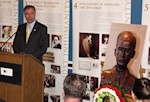 Congressman Mario Diaz-Balart, member of the Hungarian Caucus, thanked Prime Minister Viktor Orbán, Foreign Minister János Martonyi, and the Hungarian Embassy for making a special effort to use the Wallenberg Centennial as an educational moment. Finally, Congressman Andy Harris, member of the Hungarian Caucus, and the only Member of Congress of Hungarian descent, presented through his personal family history how an individual who risks his own life to save others can make a difference. He also cited the Hungarian Col. Ferenc Koszorús as a Hungarian example of rescuers who joined Wallenberg’s efforts to save innocent lives. Congressman Mario Diaz-Balart, member of the Hungarian Caucus, thanked Prime Minister Viktor Orbán, Foreign Minister János Martonyi, and the Hungarian Embassy for making a special effort to use the Wallenberg Centennial as an educational moment. Finally, Congressman Andy Harris, member of the Hungarian Caucus, and the only Member of Congress of Hungarian descent, presented through his personal family history how an individual who risks his own life to save others can make a difference. He also cited the Hungarian Col. Ferenc Koszorús as a Hungarian example of rescuers who joined Wallenberg’s efforts to save innocent lives.
To conclude the ceremony, the group walked over to the Wallenberg bust in the Capitol Visitors' Center where Mrs. Lantos recalled the story of the joint effort behind erecting a lasting memorial for the "man amidst inhumanity." - special thanks to the Embassy of Hungary for text and photos.
AHF Honors Hungarian Heroes of the Holocaust
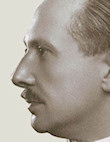 Hungary, heavily influenced by her desire to regain lost territories and reunite Hungarians in the Carpathian Basin, had found support in Italy and Germany and joined the Axis, a tragic mistake. While the Jewish community in Hungary had reason
to hope that it would be spared the fate of other Jewish communities in the countries surrounding
Hungary and elsewhere, 1944 changed everything. Hungary, heavily influenced by her desire to regain lost territories and reunite Hungarians in the Carpathian Basin, had found support in Italy and Germany and joined the Axis, a tragic mistake. While the Jewish community in Hungary had reason
to hope that it would be spared the fate of other Jewish communities in the countries surrounding
Hungary and elsewhere, 1944 changed everything.
Until 1944, Hungary had enacted a series of laws that increasingly restricted the civil liberties of Jews. But with the exception of the massacres of partisans and Jews in Novi Sad in 1942 (whose perpetrators fled to avoid prosecution by Hungarian authorities only to return to Hungary with the German occupying army in 1944) and the 16,000 “alien” Jews who were expelled to German-held
Ruthenia in 1941,1 Hungary refused Nazi Germany's demands that it deport Hungarian Jews or participate in the “Final Solution.” Thousands of Jews from surrounding states actually found refuge in Hungary whose Jewish population exceeded 800,000 in March 1944.
When Hitler's patience ran out with the conservative leaders in Budapest and their peace-feelers
and contacts with Western allies, Nazi Germany invaded Hungary in March 1944, drastically
changing the situation of Hungary and the Jews. Hitler installed a pro-German government which
collaborated with the Nazis occupiers and helped to destroy Hungary's Jewry, which had survived
under the conservative government. Adolf Eichmann arrived to direct the deportation of
Hungary's Jews so that by the end of June, virtually the entire Jewish population of the provinces
had been deported.
Until July 1944, the more than 200,000 Jews of Budapest were protected from deportation.
Consequently, and at the instigation of the Nazi occupiers, Laszlo Baky, a secretary of state in the
Ministry of Interior for "Jewish Affairs," planned to begin and quickly complete the deportation of
Jews from the capital. Hungarians foiled that plan, however.
Following the orders of Regent Horthy, Col. Ferenc Koszorus, Sr., ordered his First Armored Division into action against Laszlo Baky and pro-Nazi forces in July 5, 1944, preventing the coup and the deportation of hundreds of thousands of Jews from Budapest.2 This unparalleled action was the only case known in which an Axis power used military force for the purpose of preventing deportations. The action delayed the Nazi takeover for 3.5 months, allowing tens of thousands to escape or find refuge and also permitted Raoul Wallenberg to coordinate his successful and effective rescue mission. But history was again not on Hungary’s side. A few short years later, she was under a brutal, Soviet-installed government.
After blocking the coup, he was forced to escape the Gestapo and fled to the United States where he would eventually serve his adopted homeland in the US Topographic Command. President Truman asked him to organize Hungarian veterans in exile and train them for the eventual liberation of Hungary. President Eisenhower, despite the election rhetoric of "rolling back" Commnism, disbanded the unit before the 1956 Hungarian Revolution which surprised his administration.
The late Congressman Tom Lantos (D-CA) called Col. Koszorus a "Hero of the Hungarian Holocaust" as entered in the Congressional Record on May 26, 1994. In his introduction, Mr. Lantos said, "I rise today to recognize one of the great heros of the Hungarian holocaust. Ferenc Koszorus, who at great personal sacrifice to his own life, saved thousands of Hungarian Jews from deportation to Nazi death camps." Congressman Lantos, recipient of AHF's highest award, the Col. Commandant Michael Kovats Medal of Freedom passed away in 2008. General Koszorus
Koszorus, who passed away in 1974, was posthumously promoted to the rank of General by Prime Minister Antall
after the fall of Communism. His wife, the late artist Gabriella Koszorus-Varsa researched and edited his memoirs and summarized his memoirs like this:
"The writings of Colonel Ferenc Koszorús contain wealth of fascinating and informative data relating to a critical period of Hungarian history. Based on personal experiences, his writings portray the tragic fate of Hungary during the Second World War, including the chaos caused by internal tension. These writings, moreover, not only chronicle certain key political and military events, they also offer solutions to exceedingly complex problems within the framework of high moral bearings, without which solutions prove to be ephemeral.
Col. Koszorús military competence, expertise, and outstanding character enhanced his clear-sighted judgement. The selfless dedication he exhibited also characterized his family. He is descended from Transylvanian nobility, born into a family that voluntarily relinquished its special privileges during the Hungarian Revolution of 1848 in a demonstration of solidarity with the Hungarian nation. In this spirit, Col. Koszorús acted decisively to further the interests of his beloved homeland, motivated solely by a desire to serve the common good, even at great personal risk to himself. He was not drawn to any form of political extremism at a time when many could not resist the lure of seemingly simple answers to intricate questions or career advancement.
In an extraordinary action taken in July of 1944, Col. Koszorús intervened to block an attempted coup by Laszló Baky. Koszorús's valiant effort preserved the remnants of the legitimate Hungarian political system, prevented the overthrow of the Regent, and thwarted the deportation of the more than 250,000 Jews concentrated in Budapest. Only in Hungary did a military unit employ force against an attempted coup supported by Nazi collaborators, the German occupation forces, and Adolf Eichmann.
Col. Koszorús's merit was not only that he carried out the Regent's order at a time when such orders were generally disobeyed, but that he voluntarily offered his services to block Baky's perfidious act. He specifically requested the Regents order by way of the Commanding Officer of the Royal Guard, General Károly Lázár to preserve the legality of his intervention and thereby remain faithful to his oath. It was his unshakable convictions that "without trustworthiness there is no `soldier', without strict adherence to a soldier's military oath, there is no trustworthiness."
After blocking the Nazi coup, Col. Koszorús was sought by the German Gestapo. To avoid certain arrest and execution, he first fled to western Hungary, and then after becoming ill he took a medevac train to Austria and ultimately to Bavaria. He arrived in the United States with his family in 1951, after which he continued to serve both his former homeland as well as his adopted country, working for the U.S. Topographic Command.
In October of 1951, during the Truman administration, Congress authorized funds to organize and train legions of European immigrant veterans for the eventual liberation of their homelands. Finding Col. Koszorús to be untainted by either Nazism or Communism and judging him to be a reliable military man, the U.S. entrusted him with the task of establishing the Hungarian veteran armed force.
In addition to his new career, Col. Koszorús continued to research and write on a variety of topics relating to Central and Eastern Europe. Out of modesty, he did not initially publicize his voluntary and historic intervention against the conspirators. Only after becoming aware of the misunderstanding and disinformation surrounding the Baky affair did he take the advice of friends and publish in 1961 his version of the events, so that "this episode be preserved for posterity in a factual and objective manner."
In 2009, as part of the Holocaust Memorial Month, the Embassy of Hungary sponsored the Carl Lutz and the Legendary Glass House in Budapest traveling exhibit in Washington, DC. The Carl Lutz Foundation, Hungarian American Coalition, Lantos Foundation for Human Rights and Justice, Mensch International Foundation and the Embassies of Switzerland and Israel are co-sponsors. The Federation believes it would be appropriate that the Embassy of Hungary, as a representative of all Hungarians, expand such exhibits to include Hungarian heroes of the Holocaust. [download the statement]
In the statement, AHF honored additional Hungarian heroes:
AHF REMEMBERS THE HEROES OF THE HUNGARIAN HOLOCAUST
The Federation takes this opportunity to remember Carl Lutz, Raoul Wallenberg and other foreign
diplomats as well as the Hungarian heroes who at great personal peril saved many Jewish lives.
The Hungarians include but, of course, are not limited to the following individuals:
- Janos Esterhazy opposed the Slovak Nazi puppet regime of Jozef Tiso. At great peril to himself, he was the only member of the Slovak Parliament to vote against the law authorizing the deportation of Jews in 1942. Later, Esterhazy personally saved Jews from the Holocaust.
- General Vilmos Nagybaczoni-Nagy who upon being appointed minister of defense by the Kallay
government took measures to end the gross abuse threatening the lives of Jews and others in
the auxiliary labor force;
- Tibor Baranszky who, as secretary to Monsignor Angelo Rotta, the Vatican’s ambassador to
Budapest, saved many lives by distributing protective letters to Jews on forced marches and
elsewhere;
- Roman Catholic Priest Ferenc Kallo who gave Jews life‐saving certificates of baptism and who was killed by the Arrow Cross on October 29, 1944;
- Jozsef Antall Senior, who as a member of the ministry of internal affairs for civilian refugees
gave refuge to and thereby saved Jews and Poles and who enjoyed the support and confidence
of Minister of Interior Ferenc Keresztes‐Fischer and Prime Ministers Pal Teleki and after his death Miklos Kallay;
- Col. Ferenc Koszorus, posthumously promoted to the rank of General by Prime Minister Antall after the fall of Communism, who volunteered his services and mobilized the 1st Armored
Division under his command to militarily intervene on July 5, 1944 to stop Laszlo Baky, a secretary of state in the Ministry of Interior for “Jewish Affairs," from deporting the
approximately 200,000 plus Jews from Budapest.2
The Federation believes that the extraordinary courage, moral strength and fortitude of these and
other individuals who despite overwhelming odds were willing to confront evil and act on behalf
of humanity serve as examples for all of humankind; they must never be forgotten.
________________________________________
1 When Minister of Interior Ferenc Keresztes-Fischer learned the details of these actions, he ordered them to be stopped.
2 On the 50th anniversary of the Hungarian Holocaust, Congressman Tom Lantos (for whom one of the co-sponsoring
organizations is named) referred to Col. Koszorus as "A Hero of the Hungarian Holocaust" and stated that "[a]s a result of his
extraordinarily brave efforts, taken at great risk in an extremely volatile situation, the eventual takeover of Budapest by the Nazis
was delayed by 3 1/2 months. This hiatus allowed thousands of Jews to seek safety in Budapest, thus sparing them from certain
execution. It also permitted the famous Raoul Wallenberg, who arrived in Budapest on July 9, 1944, to coordinate his successful
and effective rescue mission." As is clear from Congressman Lantos’ remarks, had Col. Koszorus’ intervention not occurred,
Wallenberg would not have had many lives to save. Neither would have Lutz.
[<< Back to All AHF News]
|  “Whoever Saves a Life, it is Considered as if He Saved an Entire World” “Whoever Saves a Life, it is Considered as if He Saved an Entire World”
(Jerusalem Talmud)
Buy books related to the Holocaust and Col. Koszorus on AHF's Amazon Store 
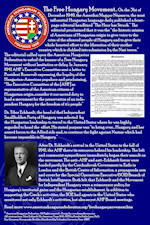 |
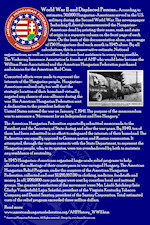 |
| AHF, Tibor Eckhardt, and
the "Free Hungary Movement"
seeking to extract Hungary
from the Axis sphere
[read more] |
AHF relief efforts during WWII [click for large image] |
Related Article:
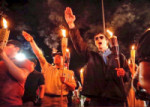 8/23/2017 - AHF issues statement condemning hatred and violence. The American Hungarian Federation (AHF) unequivocally and forcefully condemns any and all manifestations of hatred, xenophobia, discrimination and domestic terrorism. The Hungarian community understands first-hand the impact of these evil manifestations. 8/23/2017 - AHF issues statement condemning hatred and violence. The American Hungarian Federation (AHF) unequivocally and forcefully condemns any and all manifestations of hatred, xenophobia, discrimination and domestic terrorism. The Hungarian community understands first-hand the impact of these evil manifestations.
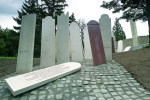 UPDATE - According to an August 29 report in JTA, a monument to Jewish Holocaust victims was vandalized in the Hungarian town of Balf. [read more] UPDATE - According to an August 29 report in JTA, a monument to Jewish Holocaust victims was vandalized in the Hungarian town of Balf. [read more]
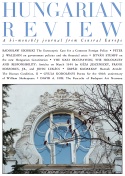 3/19/2014 - AHF article regarding the occupation of Hungary by Hitler on March 19, 1944 and its horrific consequences, entitled "Reflections on March 19, 1944 and Its Aftermath: A Perfect Storm of Tragedy and Folly." "We are concerned that a political agenda has replaced a debate based on historical facts relating to the Hungarian Holocaust and Nazi Germany's invasion and occupation of Hungary," said Frank Koszorus, Jr., the Federation's president. "We condemn not only whitewashing but the blackening of this historical record as well. Both forms of revisionism do a great disservice to the memory of the victims of evil and those who opposed it at a treacherous time in Hungary's history. These considerations prompted us to issue our statement," he added. [read more] 3/19/2014 - AHF article regarding the occupation of Hungary by Hitler on March 19, 1944 and its horrific consequences, entitled "Reflections on March 19, 1944 and Its Aftermath: A Perfect Storm of Tragedy and Folly." "We are concerned that a political agenda has replaced a debate based on historical facts relating to the Hungarian Holocaust and Nazi Germany's invasion and occupation of Hungary," said Frank Koszorus, Jr., the Federation's president. "We condemn not only whitewashing but the blackening of this historical record as well. Both forms of revisionism do a great disservice to the memory of the victims of evil and those who opposed it at a treacherous time in Hungary's history. These considerations prompted us to issue our statement," he added. [read more]
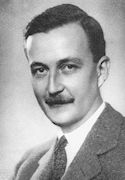 5/10/2013 - AHF publishes documents supporting the exoneration of Count János Esterházy (the only member of the Slovak Parliament in 1942 who voted against expelling the Jews, he was convicted on trumped up charges and died in a communist prison). The documents attest to his principled stand and actions to save Jews during World War II and protect the Hungarian minority in Slovakia, and includes letters from Simon Wiesenthal, Yad Veshem, and historians Dr. Magda Ádám and Dr. István Deák, Professor Emeritus from Columbia University. 5/10/2013 - AHF publishes documents supporting the exoneration of Count János Esterházy (the only member of the Slovak Parliament in 1942 who voted against expelling the Jews, he was convicted on trumped up charges and died in a communist prison). The documents attest to his principled stand and actions to save Jews during World War II and protect the Hungarian minority in Slovakia, and includes letters from Simon Wiesenthal, Yad Veshem, and historians Dr. Magda Ádám and Dr. István Deák, Professor Emeritus from Columbia University.
[read more]
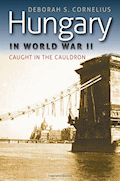 Hungary in World War II: Caught in the Cauldron by Deborah Cornelius, Fordham University Press, New York, 2011. Csaba Zoltani writes: "Deborah Cornelius’ Hungary in World War II: Caught in the Cauldron (Fordham University Press, New York 2011) gives an excellent overview of the events leading up to and the horrendous events of World War II in Hungary. The effect of the Treaty of Trianon, that without plebiscites, truncated Hungary and deprived it of its natural resources and forced a sizeable portion of its population to live under alien jurisdiction, set the political and sociological climate in Hungary from the 1920's on. [read more] or buy it now on AHF's Amazon Store! Hungary in World War II: Caught in the Cauldron by Deborah Cornelius, Fordham University Press, New York, 2011. Csaba Zoltani writes: "Deborah Cornelius’ Hungary in World War II: Caught in the Cauldron (Fordham University Press, New York 2011) gives an excellent overview of the events leading up to and the horrendous events of World War II in Hungary. The effect of the Treaty of Trianon, that without plebiscites, truncated Hungary and deprived it of its natural resources and forced a sizeable portion of its population to live under alien jurisdiction, set the political and sociological climate in Hungary from the 1920's on. [read more] or buy it now on AHF's Amazon Store! 
 2/5/2015 - AHF Honors Holocaust Memorial Month 2015, Co-sponsors Concert dedicated to International Holocaust Memorial Day and to Victims of Terrorism in Paris: The concert, held at the Hungarian Embasy in Washington, DC and organized by the Embassy Series, featured George Peachey, piano; Jerome Barry, baritone; and Jacques-Pierre Malan, cello; on January 27, the 70th anniversary of the liberation of Auschwitz, the infamous Nazi death camp where thousands of Hungarian Jews lost their lives. [read more] 2/5/2015 - AHF Honors Holocaust Memorial Month 2015, Co-sponsors Concert dedicated to International Holocaust Memorial Day and to Victims of Terrorism in Paris: The concert, held at the Hungarian Embasy in Washington, DC and organized by the Embassy Series, featured George Peachey, piano; Jerome Barry, baritone; and Jacques-Pierre Malan, cello; on January 27, the 70th anniversary of the liberation of Auschwitz, the infamous Nazi death camp where thousands of Hungarian Jews lost their lives. [read more]
 3/24/2009 - AHF Honors Holocaust Memorial Month 2009 - In 2009, as part of the Holocaust Memorial Month, the Embassy of Hungary sponsored the Carl Lutz and the Legendary Glass House in Budapest traveling exhibit in Washington, DC. The Carl Lutz Foundation, Hungarian American Coalition, Lantos Foundation for Human Rights and Justice, Mensch International Foundation and the Embassies of Switzerland and Israel are co-sponsors. The Federation believes it would be appropriate that the Embassy of Hungary, as a representative of all Hungarians, expand such exhibits to include Hungarian heroes of the Holocaust. [read more] 3/24/2009 - AHF Honors Holocaust Memorial Month 2009 - In 2009, as part of the Holocaust Memorial Month, the Embassy of Hungary sponsored the Carl Lutz and the Legendary Glass House in Budapest traveling exhibit in Washington, DC. The Carl Lutz Foundation, Hungarian American Coalition, Lantos Foundation for Human Rights and Justice, Mensch International Foundation and the Embassies of Switzerland and Israel are co-sponsors. The Federation believes it would be appropriate that the Embassy of Hungary, as a representative of all Hungarians, expand such exhibits to include Hungarian heroes of the Holocaust. [read more]
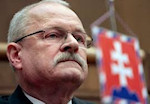 9/13/2011 - Slovak President shamefully calls Janos Esterhazy, a hero of the Holocaust, a follower of Hitler. AHF continues call for rehabilitation of Janos Esterhazy, reacts to Slovak falsification of history... Esterhazy was the only member of the Slovak Parliament in 1942 who voted against expelling the Jews, setting an example which few dared to follow in the parts of Europe controlled by Adolf Hitler's Germany. He was detained by the Nazis and died in a communist prison. He is still classified as a war criminal in Slovakia. [read more] 9/13/2011 - Slovak President shamefully calls Janos Esterhazy, a hero of the Holocaust, a follower of Hitler. AHF continues call for rehabilitation of Janos Esterhazy, reacts to Slovak falsification of history... Esterhazy was the only member of the Slovak Parliament in 1942 who voted against expelling the Jews, setting an example which few dared to follow in the parts of Europe controlled by Adolf Hitler's Germany. He was detained by the Nazis and died in a communist prison. He is still classified as a war criminal in Slovakia. [read more]
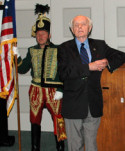 Congressional Record Congressional Record
FERENC KOSZORUS: A HERO OF THE HUNGARIAN HOLOCAUST
HON. TOM LANTOS
(Extension of Remarks - May 26, 1994)
[Page: E1109]
HON. TOM LANTOS
in the House of Representatives
THURSDAY, MAY 26, 1994
(Tom Lantos, who died in February 2008 of esophageal cancer, was honored with the Presidential Medal of Freedom, the nation's highest civilian honor. He was also recipient of AHF's highest honor, the Col. Commandant Michael Kovats Medal of Freedom [read more])
- Mr. LANTOS. Mr. Speaker, this year marks the 50th anniversary of the Hungarian holocaust. I rise today to recognize one of the great heros of the Hungarian holocaust. Ferenc Koszorus, who at great personal sacrifice to his own life, saved thousands of Hungarian Jews from deportation to Nazi death camps.
- During the turbulent time in the summer of 1944, advancing Allied forces were closing in on Berlin while Hitler was racing to implement the final solution, the destruction of the Jewish race. There were many acts of heroic compassion and humanitarianism during this period. I would like to recount the story of Col. Ferenc Koszorus, one of the most remarkable examples of bravery and courage of the time.
- By June 1944, the Nazis had incarcerated and liquidated most of the Jewish population of Europe. In the capital of Hungary, Budapest, there remained approximately 250,000 Jews still alive. Budapest was still under control of the Hungarian police force. The Nazis believed that this force was not ruthless and brutal enough to deal adequately with the complete destruction of the large remaining Jewish population of Budapest.
- Ferenc Koszorus was a colonel in the Hungarian Army in charge of the First Magyar Armored Division stationed in and around Budapest. He learned that Laszlo Baky, Secretary of State and director of all security forces, with the exception of the army, had planned a coup d'etat to install a police force completely subservient to the Nazis. They would see to it that Hungary was purged of all remaining Jews.
- With the help of the Gestapo, Baky formed several battalions of `gendarmerie' forces loyal to him. Orders from the Regent to disband the gendarmerie went unheeded. Colonel Koszorus controlled the last remaining active army unit in Hungary. At a time when few others would stand up to the Nazi occupation, Colonel Koszorus took the initiative to resist.
- Realizing the severity of the situation, Colonel Koszorus consulted with the Regent and began preparations on his own to stop Baky and the gendarmerie battalions. On July 5, 1944 at 11:30 p.m., Colonel Koszorus ordered the units of the 1st Armored Division to take up positions at strategic points in Budapest, sealing off all road leading into the city. By 7:00 a.m. on July 6, 1944 all the units were in place and Colonel Koszorus informed Baky that if his gendarmerie did not leave and disband they would be destroyed. On July 7, 1944 Baky capitulated and evacuated his forces.
- Colonel Koszorus' unparalleled action was the only case known in which an Axis power used military force for the purpose of preventing the deportation of the Jews. As a result of his extraordinarily brave efforts, taken at great risk in an extremely volatile situation, the eventual takeover of Budapest by the Nazis was delayed by 3 1/2 months. This hiatus allowed thousands of Jews to seek safety in Budapest, thus sparing them from certain execution. It also permitted the famous Raoul Wallenberg, who arrived in Budapest on July 9, 1994, to coordinate his successful and effective rescue mission
- In October 1944, after the Germans had taken Budapest, Colonel Koszorus was forced into hiding to avoid certain execution by the Gestapo. While alive, Colonel Koszorus never received recognition of his actions. In 1991, Ferenc Koszorus was posthumously promoted to the rank of general by the Hungarian Government. His memory is honored with a plaque placed in the famous Dohany Street Synagogue in Budapest.
- Therefore it is with great honor and pride that I rise today in recognition valiant, patriotic efforts of Ferenc Koszorus. Many thousands of families are alive today as a result of the heroic actions of one man who stood up for his beliefs in a very uncertain and dangerous time. His loyalty to his country and love of humanity are an inspiration to all who struggle against oppression and the vile bigotry of racism.
- Too often the efforts of those who struggle against the Nazi oppression go unrecognized. This year, the 50th anniversary of Hungarian holocaust, the world reflects on the lessons learned. I am proud to honor Colonel Koszorus, a patriot, a humanitarian, and a hero.
[< back to all AHF news]
Join online!

|



